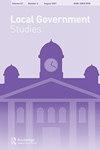治理城市:政治与政策
IF 1.9
4区 管理学
Q2 POLITICAL SCIENCE
引用次数: 2
摘要
《治理城市》旨在用思想、概念和实践案例武装读者,以理解和改进城市政治和政策。在提出许多标准理论的同时,该方法公开表示是批判性的,对新自由主义假设提出了问题,并强调了替代方案。作者部分是在新冠肺炎疫情期间撰写的,探讨了其短期和长期影响,并指出了建立一个更公平和民主的未来城市的可能性。生动和比较的例子使这些想法栩栩如生,并点燃乐观的火花。《治理城市》提出的三个核心问题是城市是如何治理的?由谁,根据什么价值?而且,为了谁?在探讨这些问题的重要性时,本书首先探讨了为什么城市很重要——不仅是世界上大多数人口的家园,也是政治转型的关键,也是明显不平等的地方。介绍了城市政权理论和城市治理理论的思想,特别关注新自由主义兴起和紧缩政策的影响。这里的一个重要重点是公民的参与,例如从20世纪80年代开始向网络治理和政府“指导”的转变。然后,注意力转向城市治理产生的战略和政策,以及“城市问题”结构的变化、政策翻译的兴起和“智慧城市”等政策结构的日益使用。研究了集体城市、作为增长机器的城市和全球城市的理论,强调了城市公平和效率目标之间的紧张关系。集体公共城市的理念越来越受到公共空间私有化的挑战,并朝着限制使用以前的公共设施的方向发展——Frug(2017)称之为城市政府的私有化。关于城市规划的历史和发展,有一场引人入胜的讨论,包括20世纪初我没有意识到的花园城市概念,最初设想城市财产由其公民拥有和合作管理,以维持城市的社会结构(这个想法的时代显然还没有到来,但在后来的城市交流讨论中又出现了)。本节最后承认,如果城市规划要变得更加公平,就需要地方领导和“地方发言权”。城市被纳入不同级别或规模的治理,这导致了对全球、国家、区域、地方和邻里进程的考虑。本文章由计算机程序翻译,如有差异,请以英文原文为准。
Governing cities: politics and policy
Governing Cities aims to arm readers with ideas, concepts and practical examples to understand and improve urban politics and policy. Whilst presenting many standard theories, the approach is avowedly critical, problematising neoliberal assumptions and highlighting alternatives. Partly written during the Covid pandemic, the author explores its shortand long-term implications and signposts the possibility of a more equitable and democratic Future City. Lively and comparative examples bring the ideas to life and light a spark of optimism. The central three questions posed by Governing Cities are ‘how’ are cities governed? By whom, and according to what value? And, for whom? Exploring the importance of these questions, the book starts by exploring why cities matter – not just as homes to the majority of the world’s population, but also as pivotal in political transformation and as sites of manifest inequalities. The ideas of urban regime theory and urban governance theory are introduced, with a particular focus on the effects of the rise of neoliberalism and austerity policies. An important focus here is on the involvement of citizens, for example in the shift to network governance and to government ‘steering’ from the 1980s. Attention then moves to strategies and policies resulting from urban governance, together with the changing construction of the ‘urban problem’, the rise of policy translation and the increasing use of policy constructs like ‘smart cities’. Theories of the collective city, the city as a growth machine, and global cities are examined, highlighting the tension between cities’ goals of equity and efficiency. The idea of the collective, public city is increasingly challenged by the privatisation of public space and moves towards restricting access to previously public provision – what Frug (2017) called the privatisation of city governments. There is a fascinating discussion of the history and development of urban planning, including the early 20 century concept of garden cities which I hadn’t realised initially envisaged city property being owned and cooperatively managed by its citizens in order to maintain the city’s social fabric (an idea whose time apparently had not yet come but which returns in the later discussion of urban communing). This section concludes with an acknowledgement of the common focus on the need for local leadership and ‘local say’ if urban planning is to become more equitable. Cities are embedded in different levels or scales of governance, and this leads to consideration of global, national, regional, local and neighbourhood processes.
求助全文
通过发布文献求助,成功后即可免费获取论文全文。
去求助
来源期刊

Local Government Studies
Multiple-
CiteScore
4.80
自引率
15.80%
发文量
43
期刊介绍:
Local Government Studies is the leading journal for the study of local politics, policy, public administration and management and governance. First established in 1975, it is an influential forum for critical dialogue and exchange on local government and a vital resource for academics, politicians, policy makers and practitioners internationally. The editors welcome submissions in this field, particularly work of a comparative, methodologically innovative and theoretically challenging nature.
 求助内容:
求助内容: 应助结果提醒方式:
应助结果提醒方式:


